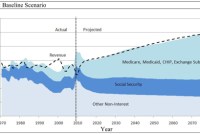After The Deluge: Health Reform Without An Individual Mandate
As challenges to the health law’s individual mandate wind their way through the courts, it is important to focus on the real question: what happens to the health law if this provision is ultimately struck down?
Insurance Reform Is Not Cost Control
Now that House Republicans, along with a few Democrats, have passed a bill to repeal last year’s health reform law, they are planning to offer some alternatives for replacing it. But how can we tell if their plans are likely to tackle the of high health care spending?
The CBO Is Telling Us Something. Is Anybody Listening?
A signficant shortcoming in the current debate about whether the health overhaul really reduces the federal deficit is that it fails to recognize the underlying problem and address it.
How The Health Reform Game Has Changed
The future trajectory of health reform will be shaped far more by interest group agendas and state-level actions than by the new House leadership’s stated plans.
Health Care Cost Control Is Hard, And Humbling
Though lots of different approaches to controlling health care costs have been discussed, it’s hard to know which of them will really work.
Competition On Access: A Role For Government In Health Care Markets
New reports indicate that some government-owned hospitals are closing while others are being sold to the private-sector. These developments may result from normal market competition. But something important could be lost as a result: access.
Tomorrow’s Medicare: The Efficient Hybrid?
Since Medicare began, how to best pay for beneficiaries’ medical services has been a persistent question.
For Cost Control, Vouchers and Medicare Don’t Mix
Medicare voucher-type plans have not, to date, been part of a cost control solution. Given the track record, it is also not unreasonable to conclude the mandatory voucher program Rep. Paul Ryan advocates wouldn’t save money either.
Senate Dysfunction and Health Care Cost Control: In Private Sector We Trust?
The senate is mired in dysfunction. Should health care cost changes come from the private sector instead?
Dispatch from Massachusetts: The Individual Mandate Is Working
Evidence shows the requirement for state residents to buy health insurance is working in Massachusetts — and we should it expect it to work in the new health overhaul as well.
The Medicare ‘Doc Fix’: How to Make Political Lemonade
The SGR system was flawed from the start and should have been fixed years ago. But now we have an opportunity to make necessary systemic changes. This lemon really can, and must, be turned into lemonade.
Medicare Advantage: You Get What You Pay For
In the long run, there’s no getting around the fact that Advantage plans will shrink in generosity and availability. Anything else would defy a fundamental law of economics that also happens to be a fundamental law of politics: you get what you pay for. And that might not be a bad thing.
The Decline Of Employer-Sponsored Coverage Under Health Reform: Good, Bad Or Ugly?
The new health overhaul law will encourage employers to stop offering health insurance. We should welcome this, provided the decline in employer coverage is gradual and good alternatives exist. The upside is that it will make more visible the biggest looming health care problem: costs.
The Health Care Cost Problem We Refuse To See
I agree with those who think the Patient Protection and Affordable Care Act doesn’t do enough soon enough to control the rate of increase in health insurance premiums. But I disagree that the solution is simply to pass more laws that regulate health insurance rates (as suggested in a May 9 New York Times editorial) […]
The Hidden Costs of Publicly Financed Private Health Insurance
There is a hidden cost how we fund health insurance in the U.S.: insurers have more information about health care than the taxpayers that help fund it. The system’s opacity gives insurers the upper hand in debates over government payment rates.
Medicare Advantage Competitive Pricing: The Political Failure of a Good Idea
Congressional meddling has become almost synonymous with Advantage administrative pricing and the trend continued after the passage of the health care reconciliation bill.
Popular But Ineffective: Repealing Insurers’ Antitrust Exemption
There are exempt insurance practices that, at least in theory and under certain conditions, could help insurers defend and expand their market share against competitors. But the exemption simply does not shield the most straightforward kinds of conduct by which companies get big.
Lessons From Massachusetts: Campaigning Beats Governing Into Submission, Again
Legislators should gather together to pass health reform legislation, even with all the structural impediments to governing created by our separation of powers and frequent elections.







